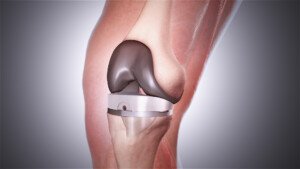Total knee replacement isn’t just for “old” people, in that sometimes, the patient is middle age or even younger.
What can cause a younger person’s knees to require joint replacement?
The reason any total knee replacement is performed is because the cartilage in the knee joint has worn down so much that there’s bone-on-bone contact between the thigh and shin bones.
Cartilage acts as a shock absorber. As it thins, there’s less shock absorption when the person walks or otherwise ambulates. Eventually this leads to pain.
The surfaces of the thigh bone, shin bone and kneecap rub together when there’s no cartilage left. Worn-down or absent cartilage is easily confirmed with X-rays.
This condition, called osteoarthritis – which is extremely common – can cause so much pain that the patient has no option but to undergo a partial or total knee replacement.
Osteoarthritis cannot be cured; its progress can only be slowed down with conservative management, namely painkilling drugs and avoidance of offending physical activities.
“Although it is not the norm, younger adults do undergo total knee replacements,” says Marc F. Matarazzo, MD, a board certified orthopedic surgeon with Total MD Family Medicine & Urgent Care.
“Typically, total knee replacements are a last resort treatment for arthritis when all other treatment has failed.
“This may be the case in young adults, but other reasons for early total knee replacements would include congenital defects, traumatic injuries, certain musculoskeletal cancers, rheumatologic conditions, circulatory problems, effects from drugs or other medical treatments, etc.”

TKR. Scientific Animations, Creative Commons/BY-SA/Attribution-ShareAlike 4.0 International
Something to consider is that over the years, TKR has become increasingly refined and durable, and it’s more likely to be offered as an option to an active middle aged person, rather than that person being told to wait till they’re much older before having the procedure done.
Another problem that can lead to the need for a TKR in middle age people is obesity.
In fact, obesity – with its skyrocketing rate – is likely the No. 1 reason more and more people in middle age are undergoing TKRs.
Obesity is the biggest modifiable risk factor for osteoarthritis.
If a younger adult has other risk factors in place such as a congenital defect or past injury from sport, being obese will certainly compound the situation and make it more likely that a TKR will eventually be needed well before age 65.
 Dr. Matarazzo specializes in sports medicine and related injuries. He performs minimally invasive and complex reconstructions, and joint replacements, of the shoulder and knee. Dr. Matarazzo is certified in the MAKO robotic-assisted knee replacement system and has 20+ years of orthopedic experience. He has a special interest in cartilage restoration and preservation.
Dr. Matarazzo specializes in sports medicine and related injuries. He performs minimally invasive and complex reconstructions, and joint replacements, of the shoulder and knee. Dr. Matarazzo is certified in the MAKO robotic-assisted knee replacement system and has 20+ years of orthopedic experience. He has a special interest in cartilage restoration and preservation.
 Lorra Garrick is a former personal trainer certified by the American Council on Exercise. At Bally Total Fitness she trained clients of all ages for fat loss, muscle building, fitness and improved health.
Lorra Garrick is a former personal trainer certified by the American Council on Exercise. At Bally Total Fitness she trained clients of all ages for fat loss, muscle building, fitness and improved health.
.


























